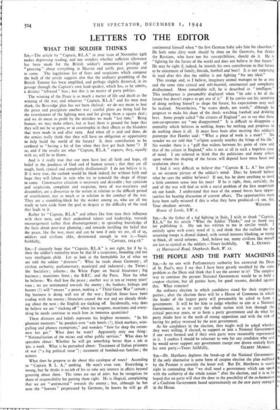Sta,—I sincerely hope that " Captain B.L.A." is not right,
for if he is, then the soldier's mentality must be that bf a suspicious, brooding and not very intelligent. child. Let us look at the formidable list of what we are told the soldier " distrusts ": What he reads about Germany ; all civilian authority, parliamentary, municipal and industrial ; the Tories ; the Socialists'; reforms ; the White Paper on Social Insurance ; big business ; munitions firms ; the B.B.C. and the Press. Now for what be believes: We shall lose the peace ; another war in ten or twenty years' time ; we are sentimental towards the enemy ; the bankers, bishops and barons (!) will " ensure " a peace, making a " Third Great War " certain ; big business is doing well out of the war ; English firms have been trading with the enemy ; financiers caused the war and are already think- ing about the next ; the English are slacking off. Incidentally, why does he believe we are " slacking off " when his weapons, munitions and every- thing he needs continue to reach him in immense quantities?
These distrusts and beliefs represent his brighter moments. " In his gloomier moments " he ponders over "safe hotels (!), black markets, wire- pulling and phoney exemptions," and wonders " hciw far deep the rotten- ness has got." What does he want? Apparently only one thing: " Nationalisation of the mines and other public services." What does he speculate about: Whether he will get something better than a job at 3os. a week. What is he perturbed about: Treatment of Italian prisoners of war (" a big political issue ") ; treatment of bombed-out families ; the miners.
What does he propose to do about this catalogue of woes? According to " Captain B. L. A.," nothing. He won't even vote. Everything is wrong, but he thinks it no job of his to take any interest in affairs beyond grousing about them. The times are out of joint, but he recognises no share of responsibility for putting them right. Ha is illogical, complaining that we are " sentimental" towards the enemy ; but, although he has seen the " horrors" perpetrated by Germans, he knows he will go all
sentimental himself when " the first German baby asks him for chocolate." He feels some dirty work should be done on the Germans, but thinks the Russians, who have. not his susceptibilities, should do it. He is " fighting for the future of the world and does not believe in that future.' He may be right if, indeed, he intends his own contribution to that future to be enjoyment of family, fireside, football and beer! It is not surprising to read after this that the soldier is not fighting "for any ideal."
This strange and, as I believe, imaginary animal manages to be at one and the same time cynical and soft-hearted, sentimental- and completely disillusioned. More remarkable still, he is described as " intelligent." This intelligence is presumably displayed when " he asks a lot of the future but doesn't expect to get any of it." If he carries out his intention of doing nothing himse'f to shape the future, his expectations may well be realised. Nevertheless, " he wants deeds, not words," although he proposes to make his share of the deeds watching football 'and drinking beer. Some people called " the citizens of England " are to see that these non-co-operators are " not disappointed." It is difficult to disappoint a mentality which believes in nothing, hopes for nothing and proposes to do nothing about it .all. It must have been after meeting this soldier's prototype that Hamlet said: " What a piece of work is a man! " No wonder we are told that " religion scarcely touches the fringe of his life." No wonder there is a " gulf that widens between his point of view and that of the citizen in England," who is not at all in such a hopeless state of mind. I am relieved to think that the politicians and many others upon whom the shaping of the future will depend have more heart and resolution about it.
I find it very difficult to believe that " Captain B. L. A." has given us an accurate picture of the soldier's mind. Does he himself believe what he says the soldier be'ieves? If not, has he done anything to instil a little common sense into his men? If he is right, then, certainly, the end of the war will find us with a social problem of the first magnitude on our hands. I understand that men of the armed forces have oppor- tunities for hearing discussion of current affairs. The opportunities must have been sadly misused if this is what they have produced.—I am, Sir,


























 Previous page
Previous page